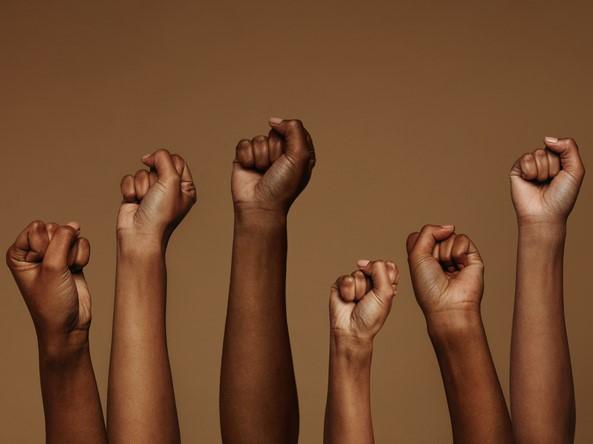The lack of Black representation at British art colleges narrows the perspectives shaping the country’s cultural landscape. Experiences of racial aggression and microaggressions can lead to disproportionately high dropout rates among Black students, and feed into the broader struggle of sustaining an artistic practice within a hostile learning environment.
Here are three ways in which The Royal College of Art Association of Black Students, Alumni & Friends (RCA BLK) has tackled these problems head-on, with effective results.
1. A space to listen
Offering a space to listen to Black student experiences has been a vital first step in understanding the difficulties they face. What sets RCA BLK apart is its comprehensive, community-driven approach throughout the student journey. We’ve found that support is only possible if you are frequently re-evaluating the needs of students. We’ve done this by having recent graduates join the RCA BLK team, to help steer the focus and address the most pressing needs of current and graduating students. It is also achieved by continuously engaging with students, staff and alumni to provide mentorship, drop-ins and peer-led crits, creating a network of support helping students to succeed academically and professionally.
- How can we support Black neurodivergent speakers?
- Five ways coaching can improve the university experience of Black students
- Black students are succeeding in spite of academia, rather than because of it
It’s also proven to be effective. Ten years ago, students were frequently requiring the support of a therapist or counsellor because of the negative experiences they were having. Now, because of the work that has been done by RCA BLK, their needs have shifted from simply surviving to addressing problems such as “how to build an artistic network” or “what does PhD study look like”.
2. A network that helps Black students thrive
Creating a far-reaching and supportive network for Black RCA students and alumni has been a central ethos for RCA BLK and is a vital component to making sure a job in the creative industry feels possible and sustainable for Black students. We’ve hosted networking events, from intimate meet-ups to large celebrations – and attended by over 500 people in the past year. These gatherings not only celebrate the success of current students and alumni but also offer important professional connections.
Tailored mentoring programmes and crit sessions also help students navigate the academic and professional art world. RCA BLK hosted a month-long residency in January 2024 through the Out Loud Arts Incubator, providing creative space, mentorship and visibility for emerging Black artists. Other initiatives included the Sankofa exhibition in December 2023 and an exhibition marking the association’s residency with Art in Romney Marsh (AiRM) in March 2024.
We also trialled other initiatives such as the RCA BLK research hub, which supports students who have just graduated to strengthen their relationship with research. This has led to students going on to viable career paths in research and academia.
Another way in which RCA BLK has strengthened its network is by hosting events and talks with key cultural institutions in the UK, raising the profile of our Black students. It also challenged the idea that the college is not a diverse or welcoming place for Black creatives.
Beyond the UK, RCA BLK has extended its network internationally, ensuring that Black students and alumni benefit from its growing global family. We did this by reconnecting with international alumni and supporting international residencies including RCA BLK x Yinka Shonibare Foundation artist residencies in Nigeria launched in spring 2024, and a research trip to the estate in Jamaica belonging to the RCA’s first Black student, Barrington Watson, this summer.
3. Financial support
Access to financial support is vital for students who might otherwise need to work alongside their studies; a challenge many Black students face when considering the college.
A key avenue for support is connecting students with available scholarships. At the RCA, these include: the Sir Frank Bowling Scholarship, which is a £1 million annual fund covering tuition fees and living expenses for UK students from Black African and Caribbean diaspora heritage. It is complemented by the Virgil Abloh and LoveFrom Scholarships.
In the academic year 2023-24, over 50 Black home fee students received some form of scholarship support.
RCA BLK also helps connect students with financial support towards activities that extend beyond their studies. These include workshops, talks or putting on external exhibitions, all of which greatly help students to create a profile outside the college.
RCA BLK’s pioneering approach has created an impact that extends beyond the college community. RCA BLK is ideally positioned to drive change from within, advocating for a more inclusive environment and providing tailored support to Black creatives to hold space in the arts in the UK and beyond.
Emily Moore is RCA BLK chair and co-founder at the Royal College of Art. The university is shortlisted for Outstanding Contribution to Equality, Diversity and Inclusion in the 2025 Times Higher Education Awards. A full list of shortlisted candidates can be found here.
If you would like advice and insight from academics and university staff delivered direct to your inbox each week, sign up for the Campus newsletter.




comment